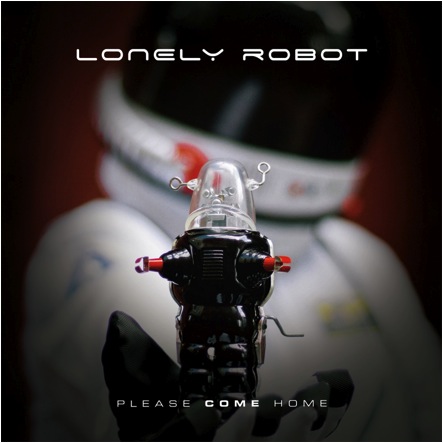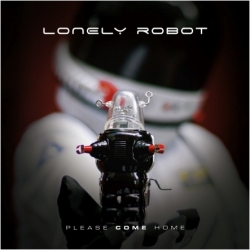Although he’s not quite as much of a household name as, say, Neal Morse, Mikael Åkerfedlt, or James Labrie, vocalist/guitarist John Mitchell is still among the most expansive, distinctive, and beloved musicians in progressive rock. As the frontman for English troupe It Bites (since 2006), as well as a crucial member of Arena, Frost*, and Gandalf’s First, he’s definitely left his mark in the genre. It’s not surprising, then, that his newest venture, Lonely Robot (and its debut offering, Please Come Home), is as engrossing, melodic, and colorful as anything else he’s done. While it’s not as much of a departure from It Bites as, say, Steven Wilson’s various projects are from each other, Please Come Home is still one of the most enjoyable albums of 2015 thus far.
Interestingly, Lonely Robot represents the first time Mitchell has truly been the mastermind behind his band. In the record’s official press release, he says, “I can honestly say it's the most fun I've ever had in the studio,” adding that the Loenly Robot moniker “represents the human condition. I'm not suggesting that human beings behave like robots, but so many people lead regimented lives and it’s easy to get stuck in a rut and not realise or know how to get out of it.”
Musically, he’s excited to have more of a clean slate, as “nobody expects anything in particular. . . [Please Come Home] is very proggy, but [it’s] more about atmosphere than technical expertise. . .” As for the other musicians in the group, Mitchell is joined by several respected guests, including Craig Blundell (Frost*), Steve “H” Hogarth (Marillion), Nick Beggs (Steven Wilson, Steve Hackett), Kim Seviour (Touchstone), and Jem Godfrey (Frost*). Finally, they album’s concept revolves around “the way in which some ancient civilisations . . . had technology way beyond what they should have had at the time . . . it’s as if some people had been transplanted onto the planet from another world and time.”
The LP starts off ominously and dazzlingly with “Airlock,” an atmospheric and foreboding voyage with soaring guitar lines, domineering percussion, and spacey synths. In other words, it pulls listeners in with the strength and suspense of, well, facing a broken airlock in space. Naturally, it builds to a chaotic crescendo before seguing into the first real song, “God vs Man.” It begins with biting bass and guitar riffs before being subdued by Mitchell’s emotive verse, which he delivers with trademark echo and sensitivity. Honestly, it sounds like a lost cut from It Bites’ phenomenal Map of the Past (especially the gripping chorus, which inarguably resembles that of “The Big Machine”). As the track progresses, the arrangement constantly changes, with effects and timbres trading off to ensure a consistently wondrous sonic journey. It also demonstrates exceptional dynamics, with its harshest moments contrasting its most serene nicely.
“The Boy in the Radio” follows a similar trajectory (get it?), although it veers a bit closer to ‘80s pop exuberance. Afterward, “Why Do We Stay” is a touching ballad in which Mitchell and Seviour duet about our purpose on “the pale blue dot” (Earth), a subject that was explored equally well on Sound of Contact’s refreshing Dimensionaut. Their voices blend beautifully and are complemented perfectly by restrained syncopation, delicate piano playing, and a poignant guitar solo, among other elements. Next, the title track proves to be the album’s most infectious moment melodically, with extremely catchy verses and an anthemic chorus, in addition to a brilliant progression from dreamy soundscapes to bursts of brutality that evoke Meshuggah and BTBAM. It’s a masterpiece onto itself.
Further on, “A Godless Sea” encases its components in a surreal coating, complete with a central piano riff that can’t help but hypnotize, while “Are We Copies” recalls elements of Pink Floyd’s “Welcome to the Machine” in its chordal momentum. Mitchell’s verses ooze prospective devastation as the instrumentation is tastefully psychedelic yet apocalyptic, and he belts out his existential questions with sublime weight and distinction (he even mentions “lonely robots” again, giving the album a slight boost in conceptual continuity). It’s eccentrically enthralling. Finally, Please Come Home concludes with the touching “The Red Balloon,” a short and somber piano ballad in which Mitchell nearly whispers his reflections. Considering that the previous couple tracks were quite bombastic, it’s fitting that this piece is simple and modest, leaving listeners in awe with introspection.
Despite its strong similarities to other Mitchell works, Please Come Home is unfalteringly emotional, enticing, colorful, powerful, and relevant in its themes (both in terms of who we are as individuals and as a species). As usual, Mitchell favors songwriting over shameless intricacy, so the musicianship is used to support—not supersede—his musings. There’s an especially nice balance between fierce exuberance and soft reflection throughout too, so listeners will always be surprised by what comes next. All in all, Lonely Robot has made an incredible first effort, filled with alluring tones, attractive melodies, and philosophical yet accessible poeticism. Don’t let this one pass you by.


